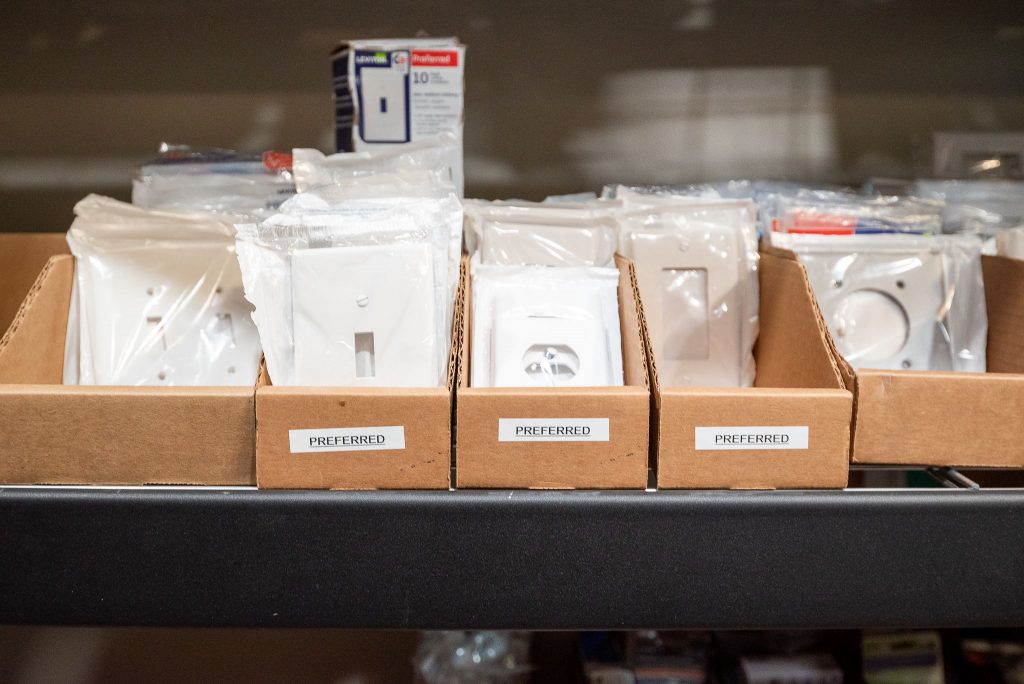SMART stands for “Self-Monitoring, Analysis, and Reporting Technology.” Smart lights are advanced systems that can be customized and controlled remotely for greater efficiency. They use wireless transmissions to send and receive signals. These lights can follow schedules and be controlled via voice activated assistants, mobile apps, or IFTTT technology.
To put it simply, smart lighting makes it easier to control how and when your lights are in use.
Different Smart Lighting Types
There is a plethora of different smart lighting options currently available on the market. Some types of smart lighting commonly used in commercial and residential use include smart bulbs, smart dimmers and switches, and whole home smart lighting systems.
What Is Whole Home Hub-Controlled Smart Lighting?
Unless it is compatible with Wifi or Bluetooth, a smart lighting system will require a smart hub to be controlled. Smart hubs can operate on a larger scale in a home or business, able to manage up to 50 bulbs at once.
In addition to lighting, smart hubs also act as the central hub for all other smart devices connected in a home. If you use several other smart devices, a smart hub is often recommended.
What Are Smart Bulbs?
Smart bulbs are individual light bulbs that can be easily installed by simply screwing them into your existing sockets. Like other smart lighting, smart bulbs are paired with your home or business’s wireless internet and controlled via smartphone using a dedicated app.
Smart bulbs can feature everything from scheduling capabilities to brightness adjustment and other in-depth light settings.
What Are Smart Dimmer Light Switches?

Smart dimmer light switches are light switches with advanced features that help give you greater control over how lights work in your home or office. While it may resemble a traditional light switch, these switches feature radio wave capabilities that can connect to a wireless network, giving you the ability to power them on and off using devices connected to the internet.
Smart switches are often a great choice if you only have a few lights in your home or place of operations that you’d like to control remotely. Due to their individual price, however, you may want to consider a more extensive smart lighting system if you want all of your lights connected to a network.
Can You Save Energy with Smart Lighting?
Absolutely! Since you can control when and how long your lights are on, you can effectively reduce your daily energy consumption.
Some smart light technology can even notify you if lights have been left on at your home or business, giving you the power to switch them off remotely. Additionally, nearly all smart lighting systems are compatible with LED fixtures, making them substantially more efficient than traditional lighting setups.
What Is the Lifespan of Smart Lighting?
Since smart lighting systems typically work with LED lights, there average lifespan can range between 15 to 25 years!
While smart LED lights may have a shorter lifespan than traditional non-smart LED bulbs, they still far exceed the lifespan of incandescent bulbs and are substantially more energy efficient.
Need Electrical Assistance in Pierce County?
Whether you’re looking to install a smart lighting system or need a full rewire of your home or workplace, Tapps Electric is here to help! Our comprehensive lineup of commercial, residential, and industrial electrical services means that we’re equipped to handle any and all electrical projects large and small. Give us a call at (253) 993-4626 or request your free estimate online today!

Get Your Free Estimate
"*" indicates required fields






